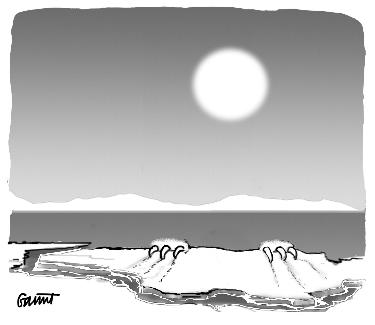
© 2004 Lawrence Moore
|
Newswatch editor Mick Kelly reports on a new assessment of Arctic climate change that concludes that human influence is now "the dominant factor" in regional trends. |
The Arctic Climate Impact Assessment study, released November 2004, was commissioned by the Arctic Council and represents the work of close to 300 scientists as well as elders of the region's Native American communities.
"The big melt has begun," said WWF climate director Jennifer Morgan. The Arctic ice cap has shrunk by 15 to 20 per cent over the past three decades and the report's projections suggest the Arctic could become near ice-free in summer by the year 2100.
Impacts are already occurring as the ice melts, permafrost thaws, buildings are losing their foundations and infrastructure is lost. Irreplaceable habitats for species such as the polar bear and seal are disappearing. There may, though, be some positive effects as oil and gas extraction becomes easier and shipping lanes open.
Responding to the report, leaders of the indigenous peoples of the Arctic called for action to slow climate change and for assistance in coping with climate impacts. "We realize that we will be forced to make some adaptations, as we are already seeing the effects of climate change in our communities. We need to be given the resources to deal with these challenges," said Geir Tommy Pedersen of the Saami Council.
An information campaign is underway. "We need to tell our own people about what is in this report," said Rodion Sulyandziga of the Russian Association of Indigenous Peoples of the North. "They are already facing many challenges, but we must prepare them for this challenge also. More than this, we need to tell the rest of the world about the necessity of taking action on climate change, and taking it now." An ice-free in summer would create substantial problems for the people who hunt in the area. The study suggests that climate change may challenge the survival of some cultures.
 |
|
© 2004 Lawrence Moore |
The leaders of the Arctic peoples slammed the United States for blocking international efforts to cut greenhouse gas emissions. "The short-term economic policy of one country should not be able to trump the entire survival of one people," said Sheila Watt-Cloutier of the Inuit Circumpolar Conference.
The foreign ministers of the Arctic Council countries, including the United States, met later in November to discuss the implications of the Arctic Assessment. Indigenous leaders called for a "robust" and "strong" declaration from the gathering. "To be honest I don't expect a good declaration," warned Geir Tommy Pedersen of the Saami Council. "The United States is the big bad wolf when it comes to climate policy. It is blocking efforts to flesh out political recommendations." The report had already led to a rift between the United States and European governments.
As it turned out, the conference declaration encouraged "effective measures" to cope with climate change but made no specific recommendations. Opposition from the United States made it impossible to reach a stronger consensus. Delegates broke into laughter when Finnish Foreign Minister Erkki Tuomioja announced that "it was the best possible declaration that could be adopted today." Delegates missed "a chance to show leadership on climate change," according to the WorldWide Fund for Nature.
Arctic peoples are joining up with small islanders to campaign against global warming. "We are two of the world's most vulnerable areas," commented Sheila Watt-Cloutier of the Inuit Circumpolar Conference. "Linking up makes a lot of sense. We can start working together, mobilizing ourselves at various UN forums or global negotiations sessions to turn up as a team," she said. The Inuit plan to petition the Organization of American States, to brand global warming a human rights abuse by the United States.
On the Web
You can download a copy of
the Arctic Climate Impact Assessment. Search the Newswatch archive for related news
reports.